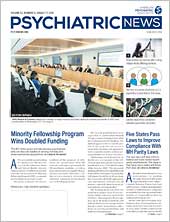Judges in Massachusetts may order individuals with a substance use disorder (SUD) who commit a crime to remain “drug free” as a condition of probation and may revoke probation for those who fail to remain abstinent, the state’s highest court ruled last month.
The judge in this case did not abuse his discretion in concluding the defendant violated her probation when she tested positive for an illegal drug during a random drug test, the Massachusetts Supreme Judicial Court ruled. Furthermore, judges may jail defendants while they are awaiting probation violation hearings, the court ruled.
As the opioid crisis worsens across the country, the case had been closely watched by patient advocacy groups, many of whom weighed in with friend-of-the-court briefs. One urged the court to consider “the scientific consensus that substance use disorder is a chronic disease of the brain” and that relapse is a symptom of the disorder that is not effectively managed by incarceration or the threat of it, according to a brief filed on behalf of the Massachusetts Medical Society and joined by six other patient advocates including the American Academy of Addiction Psychiatry.
The case underscores that much more funding is needed for treatment of opioid use disorder. “It’s a chronic issue and a sad situation where it looks like jail is the default option because we don’t have a bed to treat someone,” said John Renner, M.D., a professor of psychiatry at the Boston University School of Medicine and a member and former chair of APA’s Council on Addiction Psychiatry. “In most places, the prison system is not designed or equipped to treat people with SUD.”
Although courts have a very important role to play in holding people for what can be lifesaving treatment, Renner said, the ruling may set a troubling precedent. “I’m concerned about patients who are doing well in treatment but have a slip and then get pulled out of the community and put in jail for six months—where they will receive no treatment,” he said.
Defendant Tests Positive 11 Days After Initial Hearing
In this case, defendant Julie A. Eldred admitted in August 2016 to stealing jewelry from the home of a client and said she had sold it to support her heroin use. A judge imposed a one-year probation with special conditions that required her to remain drug free, submit to random drug screens, and attend outpatient treatment three times a week.
Eldred began outpatient treatment at a hospital, including medication-assisted treatment. But 11 days after her initial hearing, Eldred tested positive for fentanyl during a random drug test. She declined inpatient treatment, so her probation officer took her into custody. At a detention hearing, the judge said she took into consideration that the patient’s family—her support network—was out of town and that it was the start of the holiday weekend when few treatment resources would be available. She ordered Eldred to be jailed until placement in an inpatient treatment facility became available. Eldred was jailed for 10 days—receiving no substance use treatment during that time—before a bed opened up.
The defendant’s lawyer argued that since Eldred had been diagnosed with SUD, she was incapable of remaining drug free, setting her up for unconstitutional cruel and unusual punishment when the inevitable relapse occurred. Her lawyer also argued the drug-free requirement was an outdated moral judgment about an individual’s SUD and that the decision to detain her constituted a punishment for her relapse.
“The judge was faced with either releasing the defendant and risking that she would suffer an overdose and die or holding her in custody until a placement at an inpatient treatment facility became available,” the Supreme Judicial Court wrote in its decision. “Detaining a defendant may be permissible to protect the public and the defendant.”
‘People Do Respond to Consequences’
Ultimately, the decision affirming the constitutionality of court-imposed abstinence and treatment protects one of its most important tools—to deliver effective treatment to drug-using offenders, said past APA President Paul Appelbaum, M.D., the Dollard Professor of Psychiatry, Medicine, and Law and director of the Division of Law, Ethics, and Psychiatry at Columbia University.
“Many courts, including more than 3,100 drug courts in this country, routinely impose conditions of supervision or probation that require SUD treatment and abstinence,” Appelbaum said. “Studies of drug courts have found this approach reduces relapse to drug use, criminal recidivism, and overall costs.”
Laurence Westreich, M.D., an associate professor of psychiatry at New York University’s School of Medicine and past president of the American Academy of Addiction Psychiatry, noted that the judge in this case had a thoughtful response to the defendant’s relapse—acting much like a drug court would have.
“People do respond to consequences,” he added. “While revoking probation should be viewed as a last resort, jailing someone short term for a relapse may be necessary. Judges can be much more persuasive than clinicians in leading people to get help. In this case, it may have saved the defendant’s life.”
Westreich pointed out most individuals who enter SUD treatment are coerced in some way, either because their spouse is threatening to leave, their public assistance payments are going to be cut off, or they are being threatened with incarceration. “However, when we get someone in the door, whether they enter treatment voluntarily or are coerced, we know that treatment absolutely works, and that a large percentage of people get better.” ■
The Massachusetts Supreme Judicial Court’s decision in
Commonwealth v. Julie Eldred can be accessed
here.

